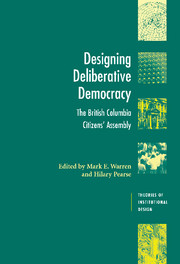Book contents
- Frontmatter
- Contents
- List of Tables
- List of Figures
- Contributors
- Preface
- Introduction: democratic renewal and deliberative democracy
- 1 Who should govern who governs? The role of citizens in reforming the electoral system
- 2 Citizen representatives
- 3 Institutional design and citizen deliberation
- 4 Agenda-setting in deliberative forums: expert influence and citizen autonomy in the British Columbia Citizens' Assembly
- 5 Descriptive representation in the British Columbia Citizens' Assembly
- 6 Do citizens' assemblies make reasoned choices?
- 7 Communicative rationality in the Citizens' Assembly and referendum processes
- 8 Deliberation, information, and trust: the British Columbia Citizens' Assembly as agenda setter
- Conclusion: the Citizens' Assembly model
- References
- Index
7 - Communicative rationality in the Citizens' Assembly and referendum processes
Published online by Cambridge University Press: 22 September 2009
- Frontmatter
- Contents
- List of Tables
- List of Figures
- Contributors
- Preface
- Introduction: democratic renewal and deliberative democracy
- 1 Who should govern who governs? The role of citizens in reforming the electoral system
- 2 Citizen representatives
- 3 Institutional design and citizen deliberation
- 4 Agenda-setting in deliberative forums: expert influence and citizen autonomy in the British Columbia Citizens' Assembly
- 5 Descriptive representation in the British Columbia Citizens' Assembly
- 6 Do citizens' assemblies make reasoned choices?
- 7 Communicative rationality in the Citizens' Assembly and referendum processes
- 8 Deliberation, information, and trust: the British Columbia Citizens' Assembly as agenda setter
- Conclusion: the Citizens' Assembly model
- References
- Index
Summary
The spread of representative democracies over the last twenty years has stimulated new interest in electoral systems, attracting scholarly attention to their determining impact on the functioning of political institutions. As well, a growing concern about public apathy toward political life and deepening distrust toward “politics” generally has signaled the need for a revitalization of the democratic polity. In that regard, attempts to resurrect the notion of the “public sphere” have produced a range of electoral reform initiatives and procedural innovations in recent years, reinforcing “the supposition that deliberation enhances democracy” (Sanders 1997: 347). This extended project of “participatory democratic regeneration” (Fung and Wright 2003: 40) has now yielded numerous rationales for “deliberative democracy” – essentially a mode of discursive public activity that encourages participants to “give reasons” in order to “justify decisions” (Gutmann and Thompson 2004: 7). Free and open dialogue is viewed as the tonic for an alienated citizenry.
A merger of these two postulated correctives to the “democratic deficit” – electoral reform and deliberative democracy – was launched in the Province of British Columbia in January 2004 with the advent of the British Columbia Citizens' Assembly.
- Type
- Chapter
- Information
- Designing Deliberative DemocracyThe British Columbia Citizens' Assembly, pp. 145 - 165Publisher: Cambridge University PressPrint publication year: 2008
- 4
- Cited by



